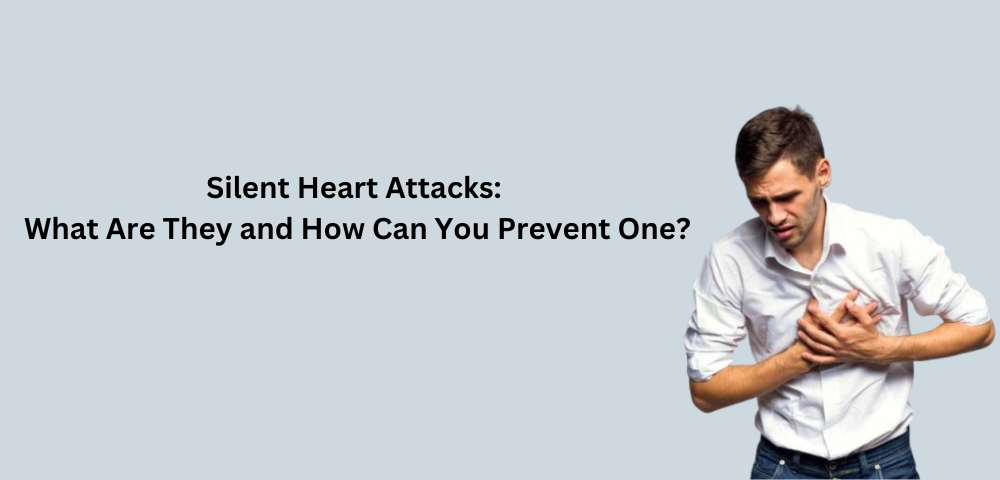Heart attacks are often associated with dramatic warning signs such as severe chest pain, sweating, and shortness of breath. However, not all heart attacks follow this pattern. Some are “silent,” meaning they occur without the classic symptoms, and many individuals may not even realize they have had one. These silent heart attacks can cause significant damage to the heart over time, yet they are often undetected until diagnosed through routine medical screenings.
In this article, we’ll explain what a silent heart attack is, identify its risk factors, explore the symptoms, and offer practical strategies to reduce your chances of experiencing one.
What is a Silent Heart Attack?
A silent heart attack, medically known as a silent myocardial infarction, refers to a situation in which the blood supply to a part of the heart is blocked, but the individual does not experience the typical warning signs of a classic heart attack. Unlike a standard heart attack with clear symptoms like intense chest pain, silent heart attacks lack noticeable indicators, making them harder to detect.
The hidden nature of a silent heart attack is one of the most concerning aspects of the condition. It may result in a weakened heart muscle without the person even realizing the event occurred. If this is not handled, it may result in severe consequences.
How Do Silent Heart Attacks Differ from Classic Heart Attacks?
Silent heart attacks differ in several ways from traditional heart attacks:
- Lack of Clear Symptoms: Many individuals report no chest pain, shortness of breath, or other typical symptoms during a silent heart attack.
- Undiagnosed for Years: Many people only discover they had one through ECG or other medical screenings.
- Risk of Long-Term Damage: While a classic heart attack may be immediately identified and treated, silent heart attacks might result in long-lasting heart damage because they are undetected.
Understanding silent heart attacks is essential because their subtlety makes early diagnosis and preventive strategies critical for heart health.
Recognizing the Symptoms of Silent Heart Attacks
Although a silent heart attack doesn’t usually exhibit dramatic warning signs, certain subtle symptoms may indicate that the heart has experienced a blockage. These symptoms can be vague, which is why it’s easy to dismiss them:
- Mild chest pain or discomfort: While not as intense as a typical heart attack, it may be felt in the chest area.
- Fatigue or weakness without reason: A sudden and unexplained lack of energy can signal underlying heart issues.
- Shortness of breath: Difficulty breathing, particularly during light exertion, could point to an issue with heart health.
- Discomfort in the back, jaw, or shoulder: This may accompany a silent heart event without being intense or obvious.
- Sweating or dizziness: These symptoms may also accompany the event but are often ignored as benign.
The subtlety of these signs highlights the importance of proactive heart care and regular medical evaluations.
Why Silent Heart Attacks are Concerning
The real danger with silent heart attacks is their delayed diagnosis. They can cause serious damage over time without immediate medical intervention, leading to complications like:
- Weakened Heart Muscle: When the heart doesn’t receive adequate blood supply due to blockage, its ability to pump blood is impaired.
- Higher Risk of Sudden Cardiac Events: A silent heart attack can lead to dangerous rhythms or arrhythmias later on.
- Progression to Heart Failure: Over time, a weakened or damaged heart may result in chronic heart failure.
The silent nature of these attacks makes them harder to diagnose and treat promptly. Early intervention and lifestyle changes can reduce their impact.
Understanding the Risk Factors for Silent Heart Attacks
Several conditions and lifestyle habits increase the likelihood of experiencing a silent heart attack. Among the most prevalent risk factors are:
- High Blood Pressure (Hypertension)
Hypertension can damage the arteries, making it harder for blood to flow freely to the heart.
- Diabetes:
Diabetes damages blood vessels over time, leading to an increased risk of cardiovascular issues like silent heart attacks.
- Obesity and Poor Diet:
Carrying excess weight and consuming foods high in fat, cholesterol, and sodium can lead to arterial blockages.
- Lack of Exercise:
Physical inactivity is directly linked to poor cardiovascular health and can increase the risk of heart disease.
- Tobacco Use:
Smoking damages the cardiovascular system by narrowing arteries and restricting blood flow.
- Excessive Alcohol Consumption:
Overindulgence in alcohol raises blood pressure and disrupts heart function.
- Family History:
Genetics play a role. A silent heart attack is more likely to occur if you have family members with a history of cardiovascular illness.
- Mental Health and Chronic Stress:
Chronic stress can increase the likelihood of heart problems, including the risk of silent heart attacks.
Recognizing these risk factors can empower you to make lifestyle changes that lower your overall risk of a silent heart attack.
Prevention Strategies: How to Lower Your Risk
Preventing a silent heart attack is possible with proactive health strategies. Implementing the following habits can dramatically reduce your risk:
- Manage Hypertension and Diabetes
Monitor your blood pressure and blood sugar regularly. Consult a healthcare provider if levels are outside the healthy range.
- Eat a Heart-Healthy Diet:
Focus on a diet rich in whole foods, including vegetables, fruits, lean proteins, whole grains, and healthy fats like olive oil and omega-3 fatty acids. Limit processed foods, trans fats, and excess sodium.
- Stay Physically Active:
Every day, try to get in at least 30 minutes of moderate activity. Walking, swimming, cycling, and yoga are excellent ways to maintain cardiovascular health.
- Quit Smoking:
Eliminate smoking from your routine to improve overall blood vessel health and reduce heart disease risks.
- Limit Alcohol:
Stick to the recommended alcohol intake to maintain blood pressure and heart function.
- Practice Stress Management:
Stress plays a significant role in cardiovascular health. Techniques such as meditation, mindfulness, and therapy can help keep stress levels low.
- Regular Health Screenings:
Preventive care is vital. Visit your healthcare provider regularly for check-ups, and consult a cardiologist for early detection. If you have concerns about your heart, schedule a consultation with experts like Dr. Akshay’s Cardiology Clinic in Pune, widely recognized as the Best Cardiologist in Pune. Early diagnosis and treatment can save lives.
Summary
Silent 0. are serious but preventable with the right lifestyle choices and medical care. Understanding your risk factors and engaging in heart-healthy habits are the first steps toward prevention.
If you suspect you may be at risk for cardiovascular disease or need heart health advice, contact Dr. Akshay’s Cardiology Clinic in Pune, the Best Cardiologist in Pune, for expert consultation and guidance.
Prevention is always better than treatment, and your heart deserves your attention. Take control of your heart health today!



